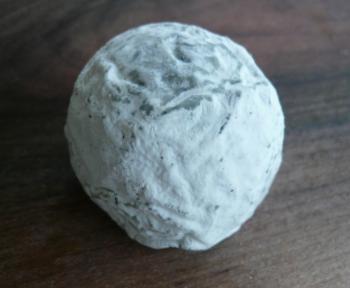Wabash Cannonball
- Producer
- Capriole Farmstead Goat Cheeses
- Country
- United States
- Region
- Indiana
- Size
- 2.5 ins diameter
- Weight
- 3 oz
- Website
- www.capriolegoatcheese.com
- Milk
- Goat
- Treatment
- Pasteurised
- Classification
- Semi Soft
- Rennet
- Animal
- Rind
- Mold Ripened
Ashed
Geotricum - Style
- Soft-Ripened (Brie-like)

Judy Schad is among a small handful of cheesemakers in the United States who were at the forefront of the farmstead cheese revolution, and she has vastly contributed to helping shape the future of the movement.
Schad has been making cheese since 1976, when she and her husband moved with their three young children from the suburbs to a hill farm in southern Indiana. They sought a sustainable lifestyle, a milk cow, and lots of gardens. When they ran the title on their new farm they discovered that it had belonged to Judy's husband's great, great grandfather in the 1870s.
Schad wanted to build a working model that others could follow, but since there were no guidelines for commercial goat dairying, they based their model, through trial and error, on an older, more traditional dairy, centered on herd health, longevity, productivity and on animals who are born, live, and die on the same farm. Her goats comprise Alpine, Saanen and Nubian breeds. She produces goat's milk cheeses across a wide spectrum of styles.
Named after the famous train and eponymous song of southern Indiana, production of the Wabash Cannonball began in 1992. Dusted with ash, the cheese is thin skinned, white, and slightly wrinkled when young. At three weeks the rind becomes more deeply wrinkled and the ash begins to peek through. The paste becomes denser, and eventually, at three to five weeks, is drier and more crumbly.
Tasting Notes
Cannonballs have a semisoft paste with a gentle, creamy, slightly acidic flavor. The rind, originally a fluffy mushroomy covering of Penicilium candidum mold that gives the cheese a snowball-like appearance, changes to a more wrinkled surface of Geotrichum candidum, which produces a musky, slightly sweet and more delicate flavor. This is a relatively minor adjustment since it doesn't affect the paste much.
Pairings
Cannonballs mix well with light-bodied, dry whites such as sauvignon blanc or grüner veltliner.



